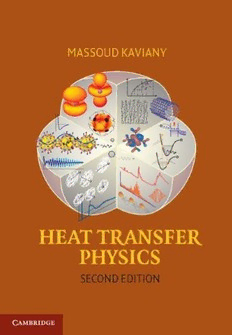
Heat Transfer Physics PDF
Preview Heat Transfer Physics
HEAT TRANSFER PHYSICS, SECOND EDITION Thisgraduatetextbookdescribesatomic-levelkinetics(mechanismsandrates) of thermal energy storage, transport (conduction, convection, and radiation), and transformation (various energy conversions) by principal energy carriers. Theapproachcombinesthefundamentalsofmolecularorbitals-potentials,sta- tistical thermodynamics, computational molecular dynamics, quantum energy states, transport theories, solid-state and fluid-state physics, and quantum optics. The textbook presents a unified theory, over fine-structure/molecular- dynamics/Boltzmann/macroscopiclengthandtimescales,ofheattransferkinet- ics in terms of transition rates and relaxation times, and its modern applica- tions,includingnano-andmicroscalesizeeffects.Numerousexamples,illustra- tions,andhomeworkproblemswithanswerstoenhancelearningareincluded. This new edition includes applications in energy conversion (including chem- ical bond, nuclear, and solar), expanded examples of size effects, inclusion of junction quantum transport, and discussion of graphene and its phonon and electronic conductances. New appendix coverage of phonon contributions to the Seebeck coefficient, Monte Carlo methods and ladder operators is also included. MassoudKavianyisaProfessorintheDepartmentofMechanicalEngineering and in the Applied Physics Program at the University of Michigan, where he hasbeensince1986.Hisareaofteachingandresearchisheattransferphysics, withaparticularinterestinporousmedia.Hiscurrentprojectsincludeatomic structuralmetricsinhigh-performancethermoelectricmaterials(bothelectron and phonon transport) and in laser cooling of solids (including ab initio cal- culationsofphoton-electronandelectron-phononcouplings),andtheeffectof porewaterinpolymerelectrolytetransportandfuelcellperformance.Hisinte- grationofresearchintoeducationiscurrentlyfocusedonheattransferphysics, treatingtheatomic-levelkineticsoftransportandinteractionofphonon,elec- tron,fluidparticle,andphotoninaunifiedmanner.Itcombinesabinitio(fine structure), molecular dynamics, Boltzmann transport, and macroscopic treat- ments, but on increasing length and times scales. He is author of the mono- graphsPrinciplesofHeatTransferinPorousMedia(2ndEd.)andPrinciplesof Convective Heat Transfer (2nd Ed.), and the undergraduate textbooks Princi- plesofHeatTransferandEssentialsofHeatTransfer.HereceivedtheCollege of Engineering’s Education Excellence Award in 2003. He is an editor of the JournalofNanoscaleandMicroscaleThermophysicalEngineeringandisonthe editorialboardoftheInternationalJournalofHeatandMassTransferandsev- eral other international journals. He is an ASME Fellow (since 1992) and an APSFellow(since2011),wasChairoftheCommitteeonTheoryandFunda- mental Research in Heat Transfer (1995–98), and is the recipient of the 2002 ASME Heat Transfer Memorial Award (Science) and the 2010 Harry Potter GoldMedal(ThermodynamicsScience). Heat Transfer Physics SecondEdition Massoud Kaviany UniversityofMichigan 32AvenueoftheAmericas,NewYork,NY10013-2473,USA CambridgeUniversityPressispartoftheUniversityofCambridge. ItfurtherstheUniversity’smissionbydisseminatingknowledgeinthepursuitofeducation,learning, andresearchatthehighestinternationallevelsofexcellence. www.cambridge.org Informationonthistitle:www.cambridge.org/9781107041783 (cid:2)c MassoudKaviany2014 Thispublicationisincopyright.Subjecttostatutoryexception andtotheprovisionsofrelevantcollectivelicensingagreements, noreproductionofanypartmaytakeplacewithoutthewritten permissionofCambridgeUniversityPress. Firstpublished2014 PrintedintheUnitedStatesofAmerica AcatalogrecordforthispublicationisavailablefromtheBritishLibrary. LibraryofCongressCataloginginPublicationData Kaviany,M.(Massoud),author. Heattransferphysics/MassoudKaviany.–Secondedition. pagescm Includesbibliographicalreferencesandindex. ISBN978-1-107-04178-3(hardback) 1.Nuclearreactorkinetics. 2.Changeofstate(Physics) 3.Heatstorage. 4.Heat–Transmission. I.Title. QC787.N8K39 2013 536(cid:2).2–dc23 2013032185 ISBN978-1-107-04178-3Hardback CambridgeUniversityPresshasnoresponsibilityforthepersistenceoraccuracyofURLsforexternal orthird-partyInternetWebsitesreferredtointhispublicationanddoesnotguaranteethatanycontent onsuchWebsitesis,orwillremain,accurateorappropriate. Tocuriosity,reason,doubt, dialogue,understanding,tolerance, andhumility. Contents Preface pagexvii Acknowledgments xxi 1 IntroductionandPreliminaries . . . . . . . . . . . . . . . . . . . . . . . . . . 1 1.1 PrincipalCarriers:Phonon,Electron,FluidParticle,and Photon 3 1.1.1 Phonon 4 1.1.2 Electron(andHole) 7 1.1.3 FluidParticle 8 1.1.4 Photon 9 1.2 EquilibriumandNonequilibriumEnergyOccupancy Distributions 10 1.2.1 NonequilibriumEnergyCarrierOccupancybyEnergy Conversion 10 1.2.2 TransportPhenomenaRelatedtoEnergyOccupancy Distributions 14 1.3 Particles,Waves,WavePacketsandQuasi-Particlesand DensityofStates 16 1.4 AHistoryofContributionsTowardHeatTransferPhysics 17 1.5 FundamentalConstantsandFine-StructureScales 20 1.5.1 BoltzmannandPlanckConstants 20 1.5.2 AtomicUnitsandFine-StructureScales 21 1.6 PrincipalCarriers:Concentration,Energy,Kinetics,and Speed 23 1.6.1 Principal-EnergyCarriersConcentration 24 1.6.2 Principal-CarrierEnergy 25 1.6.3 Principal-CarrierEnergyTransport/Transformation Kinetics 26 1.6.4 Principal-CarrierSpeed 28 1.7 PeriodicTableofElements 28 vii viii Contents 1.8 HeatTransferPhysics:Atomic-LevelEnergyKinetics 32 1.8.1 ThermalEnergyStorage 32 1.8.2 ThermalEnergyTransport 33 1.8.3 ThermalEnergyTransformation 35 1.9 DensityofStatesandCarrierDensity 40 1.10 AbInitio/MD/BTE/MacroscopicTreatments 42 1.11 Scope 44 1.12 Problems 46 2 MolecularOrbitals/Potentials/Dynamics,andQuantum EnergyStates . . . . . . . . . . . . . . . . . . . . . . . . . . . . . . . . . . . . 50 2.1 InteratomicForcesandPotentialWells 50 2.1.1 InteratomicForces 52 2.1.2 IntermolecularForces 52 2.1.3 KineticandPotentialEnergiesandPotentialWells 53 2.2 OrbitalsandInteratomicPotentialModels 58 2.2.1 AtomicandMolecularElectronOrbitals 58 2.2.2 AbInitioComputationofInteratomicPotentials 61 2.2.3 PotentialModelsandPhases 65 2.2.4 ExamplesofAtomicBondLengthandEnergy 72 2.2.5 RadialDistributionofAtomsinDensePhase 73 2.3 MolecularEnsembles,Temperature,andThermodynamic Relations 75 2.3.1 EnsemblesandComputationalMolecularDynamics 75 2.3.2 EnergyEquipartition 75 2.3.3 ThermodynamicRelations 76 2.4 HamiltonianMechanics 77 2.4.1 ClassicalandQuantumHamiltonians 77 2.4.2 ProbabilityandPartitionFunction 79 2.4.3 ErgodicHypothesisinTheoreticalStatistical Mechanics 81 2.5 MolecularDynamicsSimulations 81 2.5.1 EnsembleandDiscretizationofGoverningEquations 81 2.5.2 AMolecularDynamicsSimulationCaseStudy:L–JAr FCC 86 2.5.3 L–JFCCMDScalesinClassicalHarmonicOscillator 88 2.5.4 L–JPotentialPhaseTransformations 92 2.5.5 AtomicDisplacementinSolidsandQuantumEffects 93 2.5.6 SpecificHeatCapacity 94 2.5.7 HeatFluxVector 95 2.6 Schro¨dingerEquationandQuantumEnergyStates 96 2.6.1 Time-DependentSchro¨dingerEquationandWave Vector 97 2.6.2 BlochWaveForm 99
